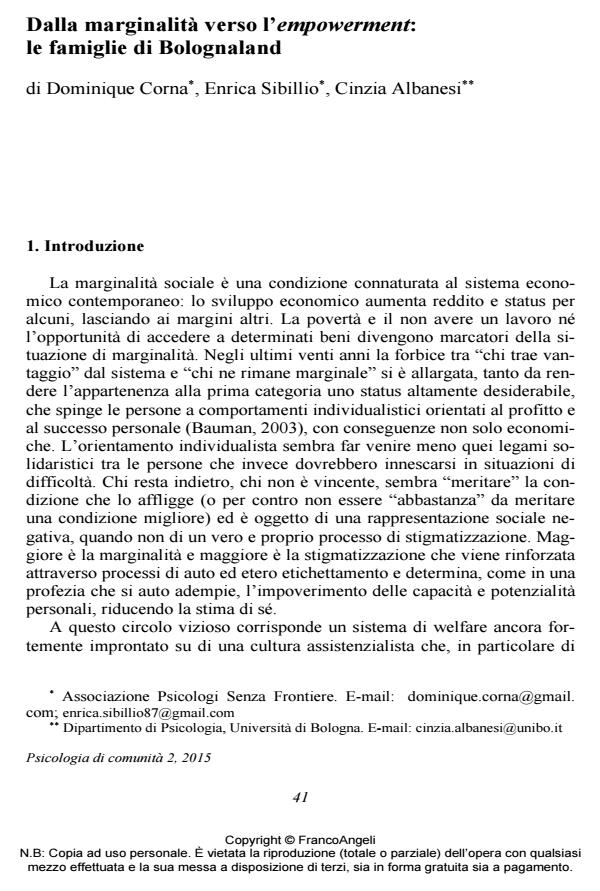From marginalization to empowerment: the families of Bolognaland
Journal title PSICOLOGIA DI COMUNITA’
Author/s Dominique Corna, Enrica Sibillio, Cinzia Albanesi
Publishing Year 2015 Issue 2015/2
Language Italian Pages 15 P. 41-55 File size 56 KB
DOI 10.3280/PSC2015-002004
DOI is like a bar code for intellectual property: to have more infomation
click here
Below, you can see the article first page
If you want to buy this article in PDF format, you can do it, following the instructions to buy download credits

FrancoAngeli is member of Publishers International Linking Association, Inc (PILA), a not-for-profit association which run the CrossRef service enabling links to and from online scholarly content.
The paper describes a Participatory Action Research that involved 6 immigrant exhomeless families. Photovoice was used to promote their social inclusion and increase participants’ empowerment. The participatory process allowed families to shift from marginalization to active citizenship, to develop a critical consciousness about homelessness and their "normal" needs. The paper points out some critical elements identified when working with marginalized people who have learned to be passive trough the interaction with the welfare system, such as the need to use research instruments in a flexible way and accommodate to unexpected participatory modes.
Keywords: Participatory action research, Photovoice, homelessness, empowerment.
- Einstein A. (1934). Il mondo come io lo vedo (II ed. 2012). Roma: Newton Compton.
- Dallago L. (2006). Che cos’è l’empowerment. Roma: Carocci.
- Fryer D. (2012). Disuguaglianza e ricerca dal punto di vista della psicologia critica di comunità. In: Zani B., a cura di (2012). Psicologia di comunità: Prospettive, idee, metodi. Roma: Carocci, pp. 87-100.
- Hall B. (1981). Participatory research, popular knowledge and power: A personal reflection. Convergence, 4(3): 617. Hodgetts D., Radley A., Chamberlain K. and Hodgetts A. (2007). Health Inequalities and homelessness: Considering Material, Spatial and Relational Dimensions. Journal of Health Psychology, 12(5): 709-725. DOI: 10.1177/135910530708059
- Mastrilli P., Nicosia R. and Santienllo M. (2013). Photovoice. Dallo scatto fotografico all’azione sociale. Milano: Franco Angeli.
- Ornelas J. (2013). Final report “Casa Primeiro”. Testo disponibile al sito: http://www.socialstyrelsen.dk/housingfirsteurope.
- Radley A., Hodgetts D. and Cullen A. (2005). Visualizing homelessness: a Study in Photography and Estrangement. Journal of Community & Applied Social Psychology, 15: 273-295. DOI: 10.1002/casp.82
- Rappaport J. (1984). Studies in Empowerment: Introduction to the Issue. Prevention in Human Service, 3(2/3): 1-7. DOI: 10.1300/J293v03n02_0
- Tilakaratna S. (1990). A Short Note on Participatory Research, Paper presented to a seminar of Sri Lankan social Scientists and community specialists in January 1990. Testo disponibile al sito: http://www.caledonia.org.uk/research.htm.
- Wang C. (2006). Youth Participation in Photovoice as a Strategy for Community Change. Journal of Community Practice, 14(1/2): 147-161. DOI: 10.1300/J125v14n01_0
- Wong Y.L.I. (1999). Utilization of community-based services among homeless persons: an application of a theoretical model. Journal of Community Psychology, 27(3):327-345. DOI: 10.1002/(SICI)1520-6629(199905)27:3<327::AIDJCOP7>3.0.CO;2-
- Zimmerman M.A. (2000). Empowerment Theory. Psychological, Organizational and Community Levels of Analysis. In: Rappaport J., Seidman E., editors
- (2000). Handbook of Community Psychology. New York: Kluwer Academic/Plenum Publishers.
- Amerio P., editor (2000). Psicologia di comunità. Bologna: Il Mulino.
- Arcidiacono C. e Marta E. (2008). La ricerca in psicologia di comunità: conoscenza, finalità trasformative e partecipazione. Psicologia di Comunità, 2: 9-27. DOI: 10.3280/PSC2008-00200
- Bauman Z. (2003). Voglia di comunità (6 ed.). Bari: Laterza.
Dominique Corna, Enrica Sibillio, Cinzia Albanesi, Dalla marginalità verso l’empowerment: le famiglie di Bolognaland in "PSICOLOGIA DI COMUNITA’" 2/2015, pp 41-55, DOI: 10.3280/PSC2015-002004